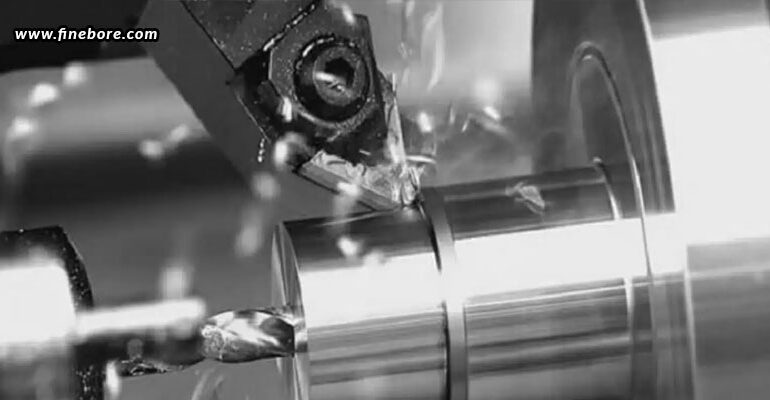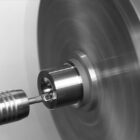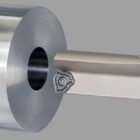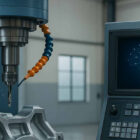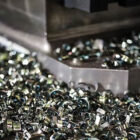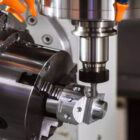In the world of small-scale precision machining, where smallest mistakes can disrupt the entire process, choosing the right boring tool is essential. Industries like electronics, medical devices, and aerospace require not only flawless surface finishes and precise tolerances, but also consistent and reliable results. This guide offers insights into selecting the best boring tools for workshops and industries handling intricate components, guaranteeing superior precision machining results.
Understanding small-scale precision machining
The goal of small-scale precision machining is to manufacture parts with minute features and incredibly tight tolerances. A deep comprehension of material characteristics, machine capabilities, and micro-tolerances is essential for success in such operations. The degree of precision required for component machining is determined by micro-tolerances, which are frequently expressed in microns. While high-precision CNC machines with remarkable stability and spindle speeds enable reliable cutting for complex designs, harder materials like titanium or ceramics require specialized tools to handle their hardness.
Industries benefiting from small-scale precision boring
Precision boring plays a vital role across diverse industries, addressing their unique demands for accuracy and quality. In aerospace, it ensures precise manufacturing of critical components like turbine blades and fuel nozzles, essential for optimal performance and safety. The medical field relies on flawless accuracy for crafting surgical instruments and implants, where even the smallest deviation can impact efficacy and patient outcomes. In the electronics industry, precision boring enables the production of micro-sized enclosures and connectors, meeting the intricate design requirements of advanced devices. By delivering exceptional precision, boring tools contribute to innovation and reliability in these high-stakes, performance-driven industries.
Challenges in small-scale boring
Precision machining for small components comes with unique challenges, including vibration, tool deflection, and material adhesion. Vibration and chatter can disrupt operations but are effectively managed using vibration-dampening boring bars or tuned dampers for stability. Tool deflection, which impacts accuracy, can be reduced by employing shorter tool lengths and rigid setups. Furthermore, materials like aluminium tend to adhere to tool surfaces, causing poor finishes. This issue can be resolved with anti-adhesion coatings or lubricants, which ensure smoother operations and superior surface finishes. By addressing these challenges proactively, precision machining achieves the consistency and quality required for intricate small-scale components.
Types of boring tools for precision machining
- Micro-boring bars: Designed for great accuracy and confined places, these are ideal for holes as small as a few millimetres.
- Adjustable boring heads: These provide the ability to precisely modify cutting diameters.
- Carbide-tipped tools: Known for their ability to withstand wear, these tools are excellent at cutting through hard materials.
- Custom boring tools: These tools are designed to meet the requirements of particular applications, and are intended for unique issues like complex geometries or severe tolerances.
Factors to consider when selecting a boring tool
- Tool material: With every material presenting unique challenges, thus choosing the right tool material is essential. Carbide tools are prized for their endurance and hardness, which make them perfect for cutting abrasive and hard materials. Tools made of high-speed steel (HSS) are an affordable way to machine softer materials without sacrificing quality. Tools with CBN or PCD tips offer remarkable lifespan and accuracy for very hard or non-ferrous materials, guaranteeing reliable performance.
- Tool geometry: Accurate rake angles, clearances, and cutting edges are all examples of optimized tool geometry that improves cutting efficiency and reduces operational problems. To obtain precise machining results for tiny components, it is crucial to choose tools that minimize vibration and deflection.
- Shank diameter: Micro-sized bores are best suited for tools with smaller shank diameters, but these tools must still be sufficiently robust to avoid chatter and guarantee steady operations during machining operations.
- Coatings: In order to achieve high performance and cost-efficiency in machining applications, advanced coatings like TiAlN, diamond, or DLC are essential since they dramatically reduce wear, improve heat dissipation, and increase tool longevity.
Advanced boring techniques for small components
- High-Speed Machining (HSM): This process is particularly useful for small parts that need precise details and tight tolerances since it can remove material more quickly without compromising precision.
- Fine-boring passes: Using several finishing passes guarantees excellent surface quality and dimensional accuracy, which is crucial in precision machining since even small flaws can affect a component’s functionality.
- Coolant application: By reducing heat generation during machining, directed high-performance coolant systems improve tool performance, prolong tool life, and preserve the integrity of the workpiece’s surface.
Tips for maximizing efficiency in small-scale boring
For small-scale boring operations to remain productive, regular tool replacements and routine inspections are essential. Maintaining ideal cutting conditions, such as exact speed, feed rates, and efficient coolant application, is essential to ensuring consistent performance and prolonging tool life. By reducing the possibility of human error and guaranteeing consistency in high-volume production, automation of repetitive operations further improves productivity. Manufacturers can obtain better outcomes, decrease downtime, and streamline processes by implementing these principles. To maximize productivity and satisfy the demanding requirements of precision machining in small-scale applications, a proactive approach to tool maintenance and operational consistency is essential.
For small-scale precision machining, choosing the best boring tool requires knowledge of the machine’s potential, tool capabilities, and material qualities. Through the use of innovative tools and techniques, and a commitment to routine inspections, industries can achieve unmatched accuracy and quality. As one of the most trusted boring tools suppliers in Bangalore, FineTech Toolings offers specialized solutions to assist companies in meeting the demanding requirements of contemporary manufacturing, while guaranteeing the best possible results in precision machining.

